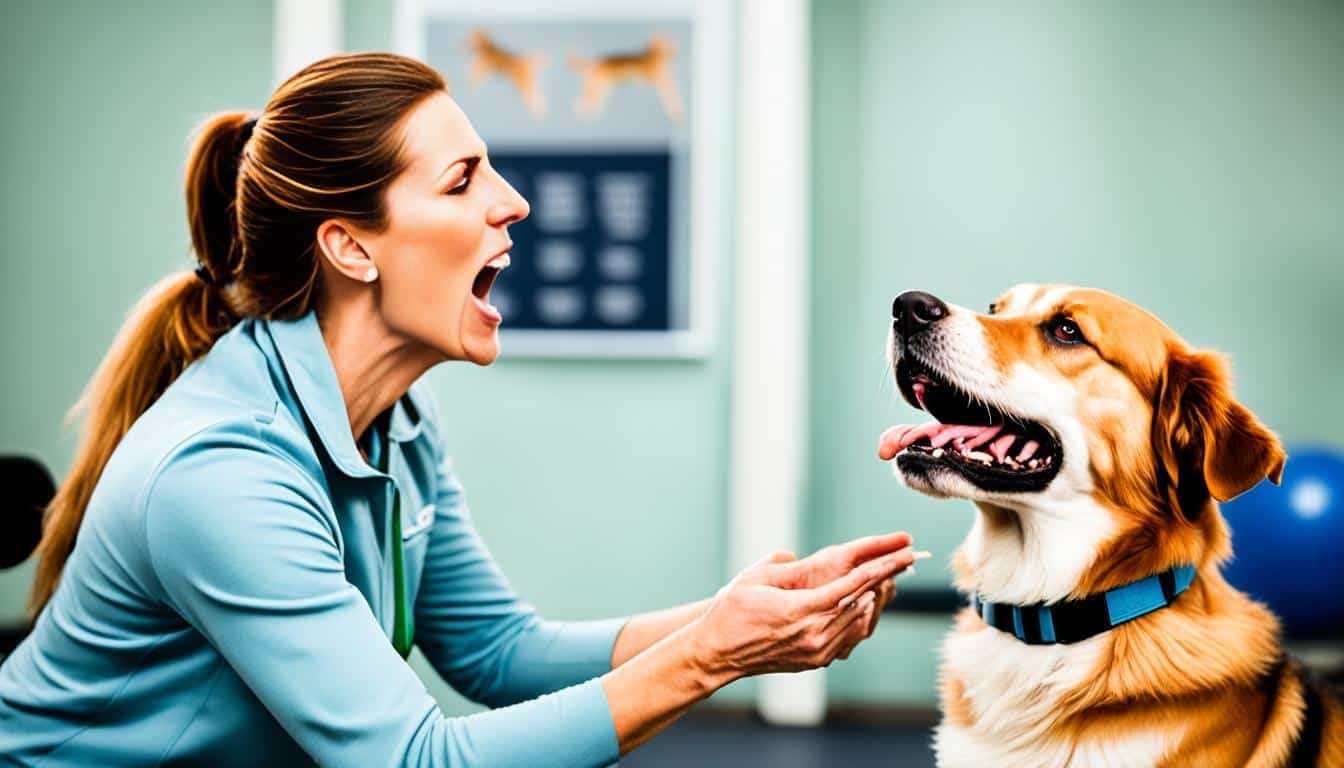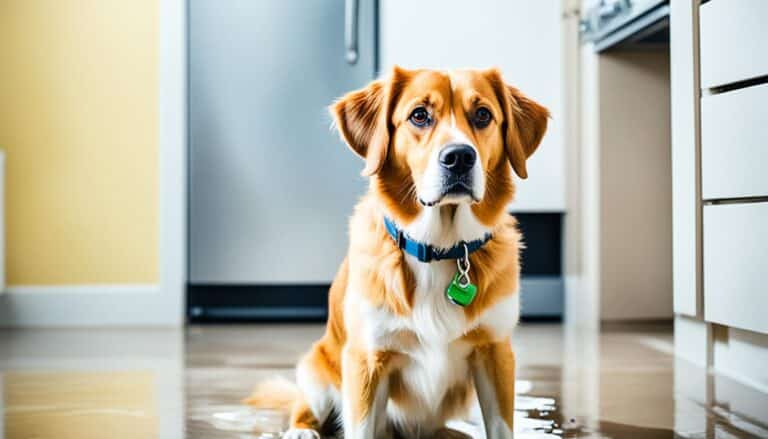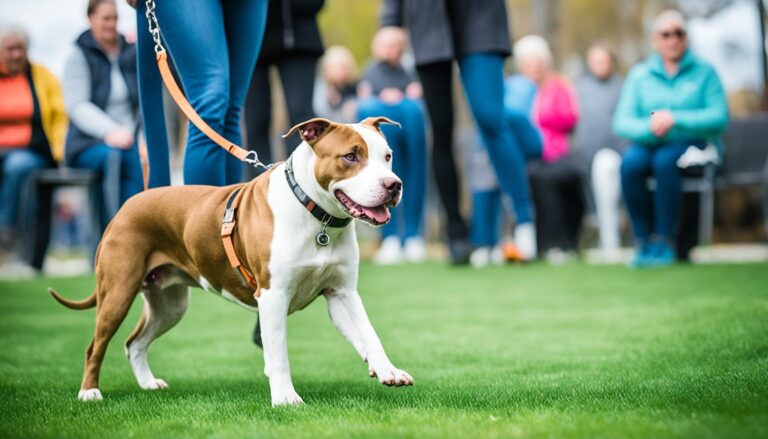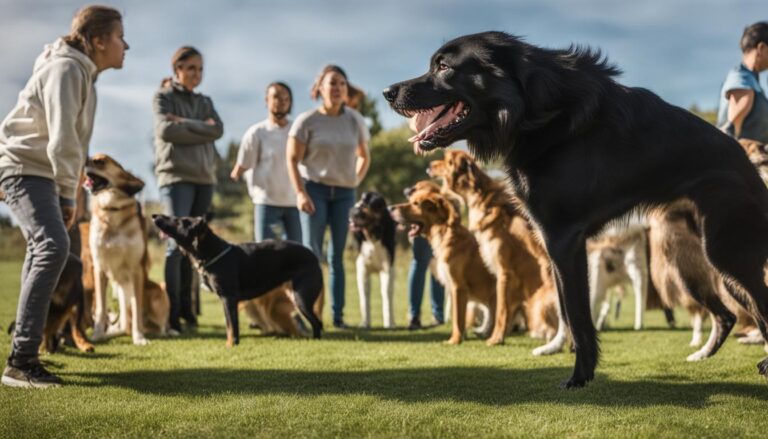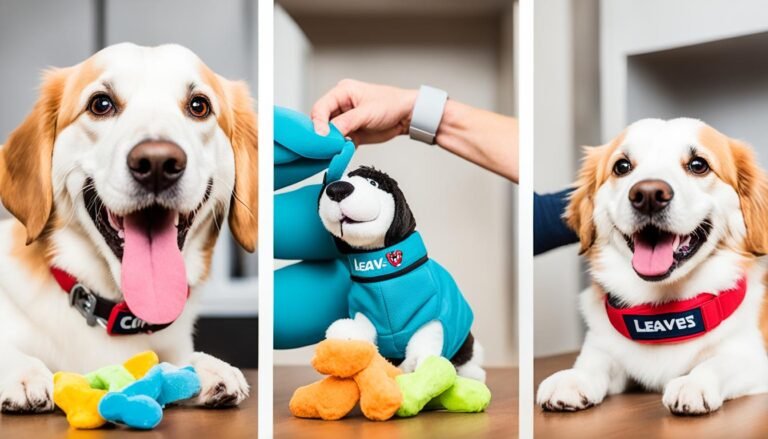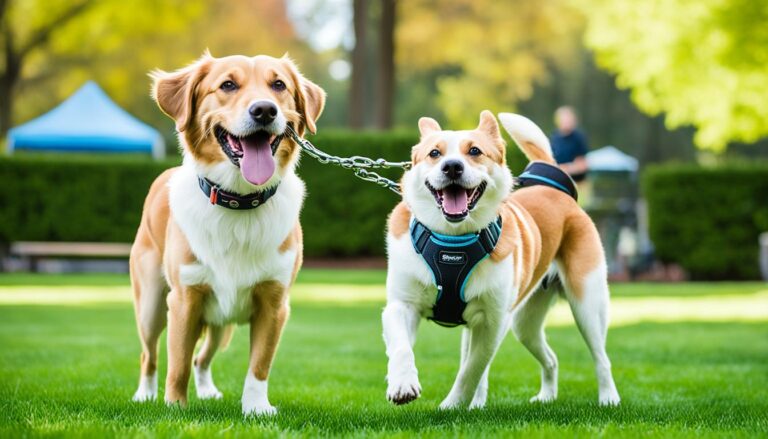Can an Aggressive Dog Be Trained?
Picture this: You’re sitting on the couch, trying to relax after a long day, when your beloved furry friend suddenly lunges at you, teeth bared and growling aggressively. Your heart races, and fear engulfs you. It’s a moment no pet owner ever wants to experience, but unfortunately, aggression in dogs is a real issue that many face.
But here’s the good news: with the right guidance and professional dog training, even the most aggressive dogs can undergo a transformation. Yes, you heard that right. Behavior modification for dogs is possible, and there is hope for change.
Aggression in dogs can be directed towards their owners or other dogs, and it needs to be addressed effectively. This article will delve into the importance of understanding the root causes of aggression, identifying triggers, and implementing techniques for training an aggressive dog.
So, if you’ve ever wondered, “Can an aggressive dog be trained?” keep reading. You’re about to discover a world of possibilities and the key to transforming your furry friend into a well-behaved companion.
Aggressive Behavior in Dogs: Warning Signs and Reasons
Aggressive behavior in dogs can be concerning and sometimes even dangerous. It’s important to be able to recognize the warning signs of aggression in dogs and understand the reasons behind it. By being aware of these signs and reasons, you can take appropriate steps to address and manage your dog’s aggressive behavior.
Some common warning signs of aggression in dogs include:
- Growling
- Showing teeth
- Lunging
- Biting
These behaviors can occur in various situations and contexts, and it’s crucial not to overlook or dismiss them. Instead, take them as early indications that there might be an underlying issue that needs attention.
The American Society for the Prevention of Cruelty to Animals (ASPCA) categorizes aggression in dogs into different types. These include:
- Territorial aggression: when a dog becomes possessive of its space
- Possessive aggression: when a dog displays aggression over its possessions, such as food or toys
- Protective aggression: when a dog acts aggressively to protect its owner or property
- Fear aggression: when a dog reacts aggressively out of fear
- Unsocialized aggression: when a dog displays aggression due to lack of proper socialization
- Defensive aggression: when a dog feels the need to defend itself
- Pain-related aggression: when a dog acts aggressively due to underlying pain or discomfort
It’s important to note that aggression in dogs can arise from a combination of genetic and environmental factors. A dog’s upbringing, past experiences, and interactions with humans and other animals can all contribute to aggressive behavior. Factors such as abuse or neglect, inadequate socialization, and traumatic events can significantly impact a dog’s behavior.
To further explore the topic, let’s take a look at some of the common triggers that can lead to aggressive behavior in dogs and how to identify and address them.
Continue reading to learn more:
Identifying the Triggers and Training an Aggressive Dog
When it comes to training an aggressive dog, the first step is to identify the triggers that provoke their aggression. These triggers could be specific people, animals, or situations that cause your dog to react aggressively. By understanding what sets off their aggression, you can develop a targeted training plan to address these specific triggers.
Working with a professional dog trainer is crucial in this process. A skilled trainer will be able to assess your dog’s behavior and help you understand the root causes of their aggression. They will work closely with you to develop a personalized training plan that focuses on modifying your dog’s aggressive behavior.
During the training process, it’s also important to rule out any underlying medical conditions that may be contributing to your dog’s aggression. Certain medical issues can cause discomfort or pain, which can manifest as aggression. A thorough veterinary examination will help ensure that your dog’s aggression is not rooted in a physical ailment.
By identifying the triggers and working with a professional trainer, you can provide your aggressive dog with the necessary training and support to overcome their aggressive behavior. With time, patience, and consistency, you can help them become a more well-behaved and balanced canine companion.
Techniques for Training an Aggressive Dog
When it comes to training an aggressive dog, positive reinforcement techniques are key. Instead of punishing your furry friend for their aggressive behavior, focus on rewarding good behavior and discouraging aggressive tendencies. By using positive reinforcement, you can create a more positive and cooperative environment for both you and your dog.
One effective technique for training aggressive dogs is counter-conditioning. This involves exposing your dog to the stimuli that trigger their aggressive behavior in a controlled and positive manner. For example, if your dog gets aggressive around other dogs, you can gradually introduce them to well-behaved and calm dogs in a safe and supervised setting. With time and patience, your dog will learn to associate positive experiences with the previously triggering situations, reducing their aggressive response.
Desensitization exercises are another valuable tool in training aggressive dogs. This technique involves gradually introducing your dog to the stimuli that provoke their aggression and gradually increasing their exposure while ensuring a positive and calm environment. By repeatedly exposing your dog to these triggers in a controlled manner, their response can become more tolerant and less aggressive over time.
Consistency is key throughout the training process. It’s important to establish clear boundaries and rules for your dog and stick to them consistently. This helps provide structure and stability, allowing your dog to understand what is expected of them. Be patient and understanding, as behavior modification takes time and effort. Results may not be immediate, but with consistent training and reinforcement, progress can be made.
Working closely with a professional dog trainer who specializes in behavior modification and positive reinforcement training is essential. These experts have the knowledge and experience to assess your dog’s behavior, identify the underlying causes of aggression, and develop a personalized training plan that fits your dog’s needs. They can provide guidance, support, and additional techniques to effectively train your aggressive dog.
Remember, every dog is unique, and what works for one may not work for another. It’s crucial to tailor the training approach to your dog’s specific needs and temperament. With patience, consistency, and the help of a professional, you can make remarkable progress in training your aggressive dog and improving their behavior.
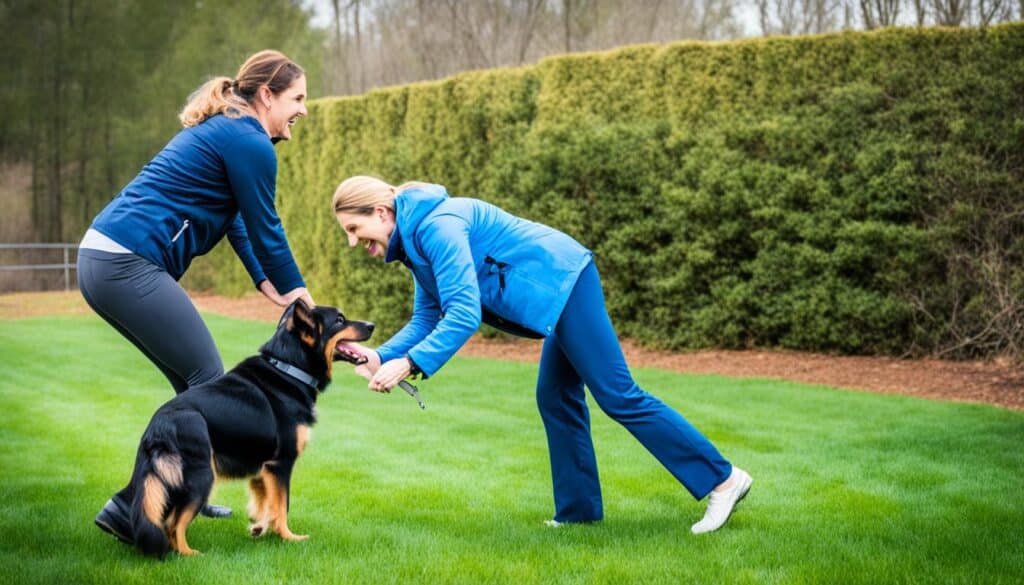
Understanding the Root Causes of Aggression in Dogs
Aggression in dogs can be the result of various root causes, including genetic predisposition, poor socialization, fear, and past trauma. Recognizing these underlying factors is essential in forming an effective training approach to address the aggression. By understanding the root causes, dog owners and trainers can develop strategies that promote positive behavioral changes and a healthier, more balanced relationship with their dogs.
Genetic Predisposition
Some dogs may have a genetic predisposition towards aggression. Certain breeds are known to have traits that make them more prone to displaying aggressive behavior. However, it’s important to note that genetics alone are not solely responsible for aggressive behavior, and proper training and guidance can help manage and modify such tendencies.
Poor Socialization
Lack of socialization during a dog’s critical developmental period can contribute to aggressive tendencies. Dogs who haven’t been exposed to a variety of people, animals, and environments may struggle to adapt to new situations, leading to fearful or defensive responses. Providing early and ongoing socialization opportunities is crucial in preventing behavior problems associated with poor socialization.
Fear
Fear is a common trigger for aggression in dogs. When dogs perceive a threat or feel endangered, they may display aggressive behavior as a defensive mechanism. Understanding and addressing the underlying fears that dogs experience is essential in helping them overcome aggression and regain confidence in potentially intimidating situations.
Trauma
Past traumatic experiences, such as abuse, neglect, or accidents, can significantly impact a dog’s behavior. Dogs that have undergone traumatic events may exhibit aggression as a result of their fear or stress responses. Patiently working with these dogs and providing a safe and supportive environment can help them heal from their past trauma and reduce aggressive behaviors.
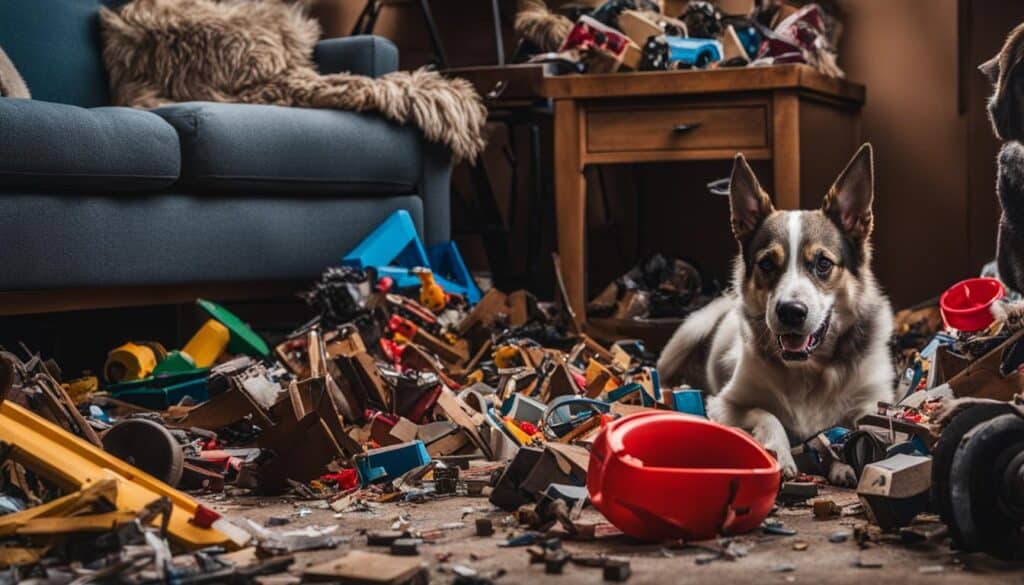
Understanding the root causes of aggression in dogs is the first step in effectively addressing and managing this behavior. By providing appropriate training, socialization, and support, dog owners and trainers can help their furry companions lead happier, healthier lives free from aggressive tendencies.
Seeking Professional Help for Aggressive Dogs
Dealing with an aggressive dog can be challenging and sometimes overwhelming. It is important to remember that you do not have to go through it alone. Seeking professional help from a certified dog behavior consultant or trainer who specializes in aggression cases can make a significant difference in addressing your dog’s behavior.
A professional dog behavior consultant or trainer has the expertise and experience to assess the situation and identify the root causes of your dog’s aggression. By understanding why your dog is behaving aggressively, they can develop a behavior modification plan tailored to your dog’s needs.
The Benefits of Professional Assistance
- Expert Assessment: Professionals can objectively evaluate your dog’s behavior, taking into consideration various factors such as breed, history, and environment.
- Personalized Approach: They can customize a behavior modification plan that addresses the specific triggers and challenges your dog faces.
- Experience and Knowledge: Professionals have extensive training and knowledge in dog behavior and training techniques, ensuring they can provide effective guidance.
- Support and Guidance: Working with a professional gives you access to ongoing support and guidance throughout the training process.
Remember, while seeking professional help is crucial, it is equally important to be an active participant in your dog’s training. Consistency, patience, and the willingness to follow the professional’s advice are key to achieving positive results.
Considering Euthanasia: A Last Resort
Euthanasia should only be considered as a last resort and after all possible options for behavior change have been exhausted. While aggressive behavior in dogs can be challenging, it does not mean that euthanasia is the only solution. With the help of a professional, many aggressive dogs can undergo successful behavior modification and lead fulfilling lives.
By seeking professional assistance, you are investing in your dog’s well-being and giving them the opportunity to overcome their aggressive behavior. Remember, there is hope for change, and with the right support, your dog can learn to manage their aggression and live harmoniously with you and others.
Hope for Change: Training Aggressive Dogs
Dealing with an aggressive dog can be a challenging and distressing situation, but there is hope for behavior change in many cases. The key is to seek help from an experienced professional dog behavior consultant or trainer who specializes in aggressive dogs. Through positive reinforcement-based methods, these experts can guide you in training your dog to modify their behavior and learn more appropriate ways to interact with the world.
When working with an aggressive dog, it’s crucial to catch the aggression early and address it promptly. The longer the behavior goes unaddressed, the more deeply ingrained it becomes. A professional trainer will assess your dog’s specific situation and design a customized training plan that focuses on positive reinforcement and behavior modification.
Positive reinforcement is a powerful tool in training aggressive dogs. It involves rewarding and reinforcing desired behaviors while ignoring or redirecting unwanted behaviors. By consistently rewarding your dog for good behavior and creating a positive association with previously triggering situations or stimuli, you can gradually reshape their response patterns.
Additionally, building a strong and healthy bond between you and your dog is crucial for successful behavior change. Positive reinforcement-based methods not only teach your dog new behaviors but also strengthen the trust and connection between you both. This bond creates a solid foundation for continued progress and transformation.
